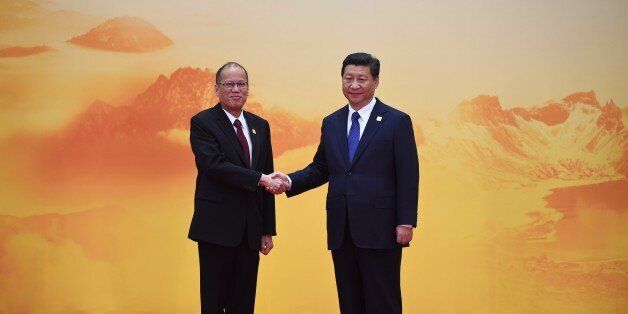The president of the Philippines, Benigno Aquino, became the second of two close American allies (after Japan’s Prime Minister Shinzo Abe) to shake hands with President Xi Jinping of China this week. Xi and Aquino shared promises to constructively manage tensions in the South China Sea, a promising step forward after several years of maritime incursions into territory both countries claim as their own.
Analysts say, however, the gesture, which came on the sidelines of the APEC meeting in Beijing, may not entirely calm the waters.
“Don’t take Asian security for granted,” Robert Kaplan, the author of “Asia’s Cauldron: The South China Sea and the End of a Stable Pacific,” said during a panel discussion at the Asia Society in New York on Wednesday. “There’s too much tension.”
There is a “naval, air, cyber, [and] high end arms race in East Asia,” Kaplan said. “East Asia is as much a military climate as other parts of the world.”
This does not mean there must be war, he cautioned. “More likely,” he said, “what all of this means is that we are entering a more crowded, nervous, anxious world, a world more crowded with warships.”
In this environment, he said, perceptions matter as much as action.
The Philippines in particular is anxious that China is out to thwart its ambitions, and control of the South China Sea could make all the difference.
“The Philippines is a poor nation,” Kaplan said. “It’s not like the Asian tiger economies. It’s only starting its economic run. And there is a perception in the Philippines that the Chinese are going to steal their ability to become a middle class society because there’s oil there.”
THE REAL DISPUTE IS NOT ABOUT RESOURCES
And yet, the oil and gas that may or may not lie under the South China Sea are not the most important reason for these disagreements, the panelists said. “These disputes are not about energy at all,” said Holly Morrow, a fellow at Harvard’s Belfer Center. “Nobody has any idea how much oil and gas is in the disputed areas of the South China Sea.”
The disagreements, she insisted, were more about politics, power and image.
Nearly all the countries involved in the dispute have indulged in symbolic posturing. In 2012, Vietnam sent six Buddhist monks to revitalize — and serve as abbots of —abandoned temples on islands in the Spratly archipelago, which China claims. Later, Philippine troops got together with their Vietnamese counterparts to play volleyball and drink beer on another island that China claims.
None of this went unnoticed in China, of course. Vietnamese and Philippine sailors and fishermen who have the misfortune to meet a Chinese coast guard cutter at sea in a disputed area are sometimes confronted by water cannons. In May, a Vietnamese fishing boat sunk after being rammed by a Chinese vessel.
Partly, this is intended as a message to Washington through its Asian allies, the panelists said. China, they said, continues to be nervous about American power and intentions in the Pacific, and with some justification. In the Chinese media, Zha Daojiong, a professor at Peking University, said via Livestream, there is “much imagining that America is just out there to get China.”
Morrow elaborated: “If China’s ambitions in Asia are to assert its dominance over its neighbors, to coerce its neighbors and eject the U.S., then the U.S. aim is to thwart Chinese ambitions. There are certain Chinese objectives that the U.S. is fundamentally in disagreement with.”
The establishment of a legally binding agreement between claimants, with penalties to wrongdoers, is also fraught with complications.
“Who’s going to verify whom?” Zha wondered. “How do you define status quo? And should one party be determined to have violated the status quo, what next? What resolution? A military effort to evict or to blast off a manmade structure? If you say it’s legally binding, then you have to design the mechanism to make it binding. How do we enforce it? Whom will enforce it?”
SHARED USE OF THE SEA
In the end, the panelists agreed, the best of all possible outcomes would be an agreement on dual-and multi-use of disputed ocean territory. It’s not a matter of drawing a line, they said, with China taking one side and Vietnam and the Philippines and other claimants taking other sides.
“Each side can have an equal amount of fishery rights, can equally divide the energy finds, whatever there may be,” said Kaplan. “It’s about use of the sea as much as it is where one state’s sovereignty begins and one state’s sovereignty ends.”




